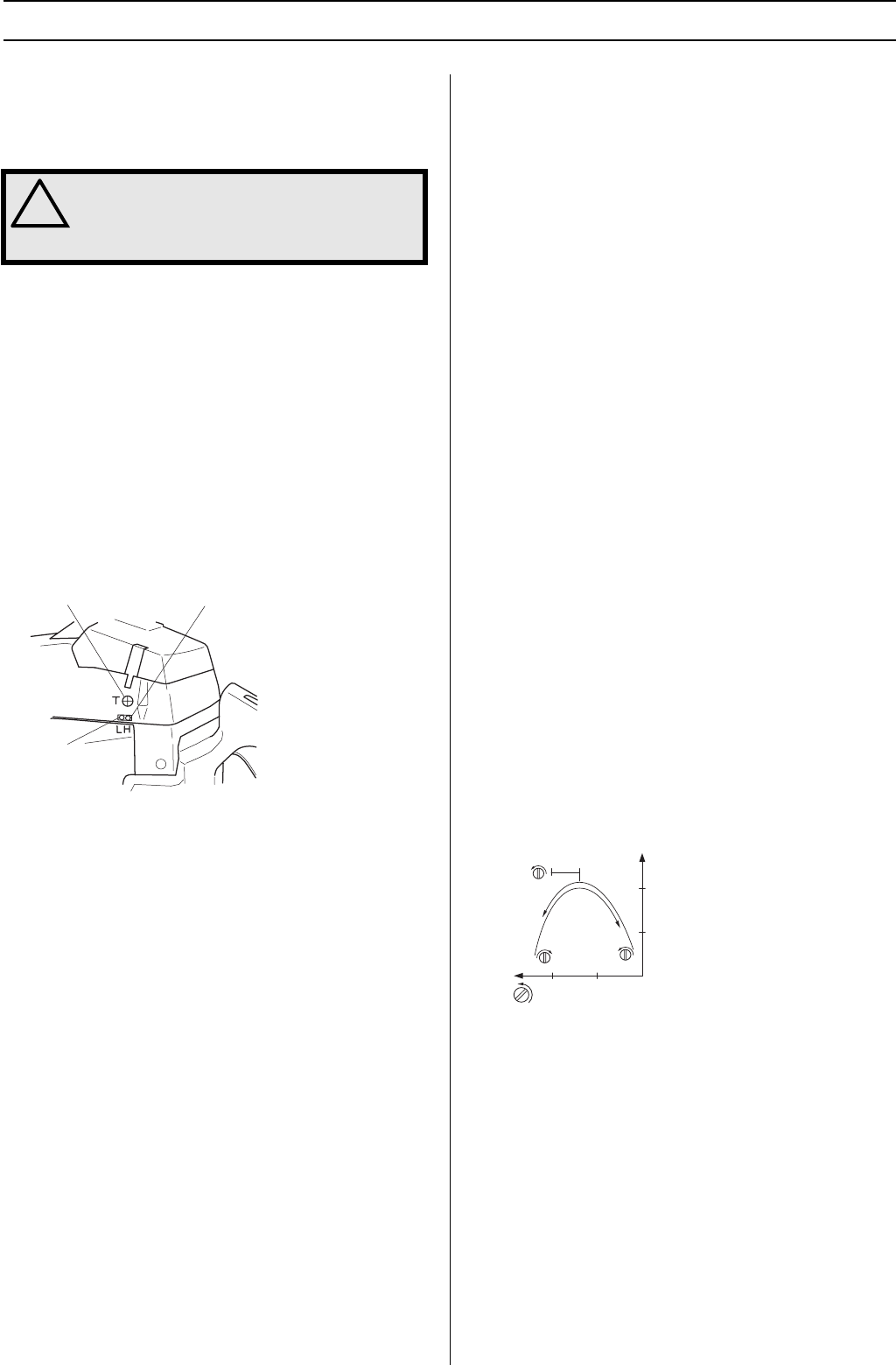
English – 29
MAINTENANCE
Carburettor
Function, Basic settings, Fine adjustment
Function
• The carburettor governs the engine’s speed via the
throttle control. Air and fuel are mixed in the carburettor.
The air/fuel mixture is adjustable. Correct adjustment is
essential to get the best performance from the machine.
• Adjusting the carburettor means that the engine is
adapted to local operating conditions, e.g. climate,
altitude, petrol and the type of 2-stroke oil.
• The carburettor has three adjustment controls:
- L = Low speed jet
- H = High speed jet
- T = Idle adjustment screw
• The L and H-jets are used to adjust the supply of fuel to
match the rate that air is admitted, which is controlled with
the throttle. If they are screwed clockwise the air/fuel ratio
becomes leaner (less fuel) and if they are turned anti-
clockwise the ratio becomes richer (more fuel). A lean
mixture gives a higher engine speed and a rich mixture
gives a lower engine speed.
• The T-screw regulates the throttle setting at idle speed. If
the T-screw is turned clockwise this gives a higher idle
speed; turning it anti-clockwise gives a lower idle speed.
Basic settings and running in
The basic carburettor settings are adjusted during testing at
the factory. The basic settings are H = 1 turn and L = 1 turn.
To provide the engine’s components with good initial
lubrication (during running in) the carburettor should be set for
a richer fuel mixture for the first 3-4 hours that the chain saw
is in use. To do this, adjust the fast idle speed to 600-700 rpm
below the recommended max. fast idle speed.
If you are unable to check the fast idle speed using a
tachometer the H-jet should not be set for a leaner mixture
than given in the basic settings. The recommended max. fast
idle speed must not be exceeded.
CAUTION! If the chain rotates while idling the T-screw
must be turned anti-clockwise until the chain stops.
Fine adjustment
When the machine has been ”run-in” the carburettor should
be finely adjusted. The fine adjustment should be carried out
by a qualified person. First adjust the L-jet, then the idling
screw T and then the H-jet. The recommended engine
speeds are as follows:
Changing the type of fuel
Fine tuning may be required if the chain saw, after changing
the type of fuel, performs differently with regard to starting,
acceleration, max. speed, etc.
Conditions
• Before any adjustments are made the air filter should be
clean and the cylinder cover fitted. Adjusting the
carburettor while a dirty air filter is in use will result in a
leaner mixture next time the filter is cleaned. This can give
rise to serious engine damage.
• Carefully turn the L and H-jets clockwise as far as they will
go. Now turn the jets one turn anti-clockwise. The
carburettor is now set to H = 1 and L = 1.
• Now start the machine according to the starting
instructions and let it warm up for 10 minutes. CAUTION!
If the chain rotates while idling the T-screw must be
turned anti-clockwise until the chain stops.
• Place the machine on a flat surface so that the bar points
away from you and so that the bar and chain do not come
into contact with the surface or other objects.
Low speed jet L
Try to find the highest idle speed by turning the low speed jet
L clockwise then anti-clockwise. When the highest speed has
been found, turn the low speed jet L 1/4 turn anti-clockwise.
CAUTION! If the chain rotates while idling the T-screw
must be turned anti-clockwise until the chain stops.
Fine adjustment of the idle speed T
Adjust the idle speed with the T-screw. If it is necessary to re-
adjust, turn the T-screw clockwise while the engine is running,
until the chain starts to rotate. Then turn anti-clockwise until
the chain stops. When the idle speed is correctly adjusted the
engine should run smoothly in every position and the engine
speed should be safely below the speed at which the chain
starts to rotate.
!
WARNING! Do not start the chain saw unless
the bar, chain and clutch cover (chain brake)
are fitted, otherwise the clutch may come
loose and cause personal injury.
L
H
T
Max. fast idle speed, rpm Idle speed, rpm
362XP 13500 2700
365 12500 2700
372XP 13500 2700
L
+ 1/4


















